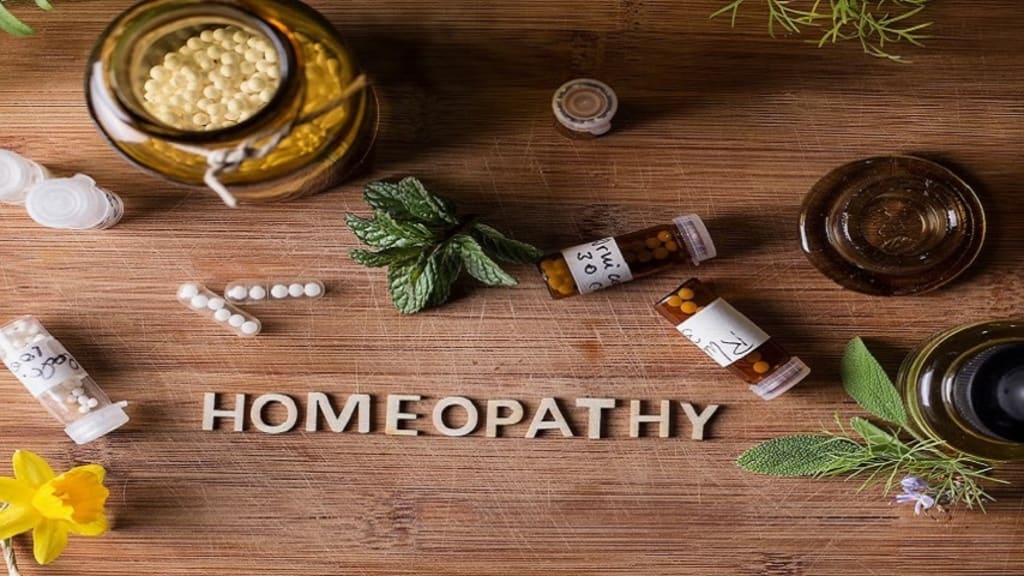Unlocking the Secrets of Homeopathy: A Detailed Guide
The Best Homeopathic Doctor in Delhi

Homeopathy, a natural and holistic approach to medicine, has intrigued and puzzled people for centuries. Are you looking the Best Homeopathic Doctor In Delhi for your treatments like fistula, asthma and other, then contact with Dr. Rashmi Chandwani from CCube Homeopathic. This detailed guide will unravel the mysteries of homeopathy, providing insights into its principles, applications, and benefits.
Introduction
Definition of Homeopathy
Homeopathy is a system of alternative medicine based on the principle of treating "like with like." This means that substances that produce symptoms in a healthy individual can be used to treat similar symptoms in a sick person when administered in highly diluted forms.
Brief History of Homeopathy
Homeopathy was developed in the late 18th century by Samuel Hahnemann, a German physician who became disillusioned with the harsh practices of conventional medicine at the time. Hahnemann's innovative approach laid the foundation for what has now become a globally recognized form of treatment.
Purpose of the Guide
The aim of this guide is to provide a comprehensive overview of homeopathy, from its historical roots to modern-day applications, and to help you understand how it can be a valuable addition to your health and wellness toolkit.
What is Homeopathy?
Core Principles of Homeopathy
The core principles of homeopathy include the Law of Similars, the Law of Minimum Dose, and the emphasis on individualized treatment. These principles guide homeopaths in selecting and administering remedies.
How Homeopathy Differs from Conventional Medicine
Unlike conventional medicine, which often focuses on treating symptoms directly, homeopathy aims to stimulate the body's own healing processes. This holistic approach considers the physical, emotional, and mental aspects of health.
History of Homeopathy
Origins and Founder: Samuel Hahnemann
Samuel Hahnemann's quest for a gentler and more effective form of treatment led to the creation of homeopathy. His seminal work, "The Organon of the Healing Art," laid down the theoretical and practical foundations of homeopathy.
Evolution Over the Centuries
Homeopathy has evolved significantly since its inception, adapting to new scientific discoveries and integrating with other forms of medicine. Despite facing criticism and skepticism, it has persisted and grown, particularly in Europe, India, and South America.
Homeopathy Today
Today, homeopathy is practiced worldwide and is recognized as a complementary and alternative medicine (CAM). It is regulated in many countries, and homeopathic remedies are widely available in pharmacies and health stores.
Principles of Homeopathy
Law of Similars
The Law of Similars, or "like cures like," is the cornerstone of homeopathy. It suggests that a substance causing symptoms in a healthy person can be used to treat similar symptoms in a sick person when prepared homeopathically.
Law of Minimum Dose
This principle involves using the smallest possible dose of a remedy to elicit a healing response. Homeopathic remedies are often diluted to the point where no molecules of the original substance remain, yet they are believed to retain therapeutic efficacy.
Individualized Treatment
Homeopathy emphasizes personalized treatment, taking into account the unique physical, emotional, and psychological characteristics of the individual. This approach contrasts with the one-size-fits-all model often seen in conventional medicine.
How Homeopathic Remedies Are Made
The Potentization Process
Potentization is a process unique to homeopathy that involves serial dilution and succession (vigorous shaking). This method is thought to enhance the healing properties of the original substance while minimizing toxicity.
Dilution and Succussion
Remedies are prepared by repeatedly diluting a substance in water or alcohol and then shaking it vigorously. This process is believed to transfer the energetic imprint of the substance to the diluent.
Types of Homeopathic Remedies
Homeopathic remedies can be derived from various sources, including plants, minerals, and animals. They are available in different forms such as pellets, tablets, liquids, and creams.
Homeopathic Treatments for Common Ailments
Cold and Flu
Homeopathy offers remedies like Oscillococcinum and Gelsemium for alleviating cold and flu symptoms. These treatments aim to reduce the severity and duration of the illness.
Allergies
Remedies such as Allium cepa and Sabadilla are used to manage allergy symptoms like sneezing, itching, and watery eyes. Homeopathy seeks to address the underlying sensitivity to allergens.
Digestive Issues
Nux vomica and Arsenicum album are common remedies for digestive complaints such as indigestion, heartburn, and diarrhea. They help restore balance to the digestive system.
Stress and Anxiety
Homeopathic remedies like Ignatia and Argentum nitricum are used to support emotional well-being and reduce anxiety. These treatments aim to promote a sense of calm and balance.
Understanding Homeopathic Consultations
What to Expect in a Consultation
A homeopathic consultation typically involves a detailed discussion of your health history, lifestyle, and symptoms. The homeopath seeks to understand you as a whole person to tailor the treatment plan.
The Importance of Detailed Case Histories
Accurate and thorough case histories are crucial in homeopathy. They help the homeopath identify patterns and select the most appropriate remedy for your unique situation.
Follow-Up and Monitoring
Regular follow-up consultations are important to monitor progress and make any necessary adjustments to the treatment plan. This ongoing evaluation ensures optimal results.
Safety and Efficacy of Homeopathy
Scientific Studies and Evidence
The efficacy of homeopathy is a subject of ongoing research and debate. Some studies suggest positive outcomes, while others find no significant difference compared to placebo. The highly individualized nature of homeopathy makes standard clinical trials challenging.
Debates and Controversies
Homeopathy has its share of critics who question its scientific basis and effectiveness. Despite this, many patients and practitioners report positive experiences and outcomes.
Safety Considerations
Homeopathic remedies are generally considered safe, with minimal risk of side effects due to their high dilution. However, it is important to consult a qualified homeopath to ensure appropriate use.
Homeopathy for Chronic Conditions
Long-Term Management
Homeopathy can be effective for managing chronic conditions such as arthritis, asthma, and eczema. It aims to address the root causes and promote long-term healing.
Case Studies and Success Stories
Numerous case studies and anecdotal reports highlight the benefits of homeopathy in chronic disease management. These stories offer hope and encouragement for those seeking alternative treatments.
Integration with Conventional Treatments
Homeopathy can complement conventional treatments, providing a holistic approach to health care. Many patients use it alongside allopathic medicine to enhance overall well-being.
Pediatric Homeopathy
Homeopathy for Children
Homeopathy is popular for treating children due to its gentle and non-invasive nature. Remedies can address common childhood ailments such as colic, teething, and ear infections.
Common Pediatric Remedies
Remedies like Chamomilla for teething pain and Belladonna for fever are frequently used in pediatric homeopathy. These treatments are tailored to the unique needs of children.
Safety and Dosage Guidelines
Homeopathic remedies are safe for children when used correctly. It is important to follow dosage guidelines and consult a homeopath for appropriate recommendations.
Homeopathy for Pets
Benefits for Animals
Homeopathy can benefit pets by addressing a variety of health issues without the side effects of conventional drugs. It can be used for conditions such as skin problems, anxiety, and digestive disorders.
Common Remedies for Pets
Remedies like Arnica for trauma and Apis for insect bites are commonly used in veterinary homeopathy. These treatments can improve your pet's quality of life.
Consultation and Administration
Consulting a veterinary homeopath ensures that your pet receives the right remedy and dosage. Proper administration is key to achieving the desired results.
Choosing a Homeopath
Credentials and Qualifications
When choosing a homeopath, it is important to verify their credentials and qualifications. Look for practitioners who are certified and have received formal training in homeopathy.
Finding a Reputable Practitioner
Seek recommendations from trusted sources, such as friends, family, or healthcare providers. Online reviews and professional associations can also help you find reputable practitioners.
Questions to Ask
Prepare a list of questions to ask potential homeopaths, such as their experience with specific conditions, treatment philosophy, and expected outcomes. This will help you make an informed decision.
DIY Homeopathy
Basic Remedies to Keep at Home
Having a basic homeopathy kit can be useful for treating minor ailments. Common remedies include Arnica for bruises, Nux vomica for indigestion, and Aconite for sudden illnesses.
Self-Care Tips and Guidelines
Educate yourself on the proper use of homeopathic remedies. Resources such as books and online courses can provide valuable information on self-care and first aid.
When to Seek Professional Help
While DIY homeopathy can be effective for minor issues, it is important to seek professional help for serious or persistent conditions. A qualified homeopath can provide expert guidance and treatment.
Misconceptions and Myths about Homeopathy
Common Misunderstandings
Homeopathy is often misunderstood and misrepresented. Common misconceptions include the belief that it is the same as herbal medicine or that it works through a placebo effect alone.
Clarifying Facts vs. Fiction
Education is key to dispelling myths about homeopathy. Understanding its principles, preparation methods, and therapeutic potential can help clarify misconceptions and highlight its benefits.
Conclusion
Homeopathy is a holistic and personalized approach to medicine that has been practiced for over two centuries. Its principles of treating "like with like" and using highly diluted remedies offer a unique way to stimulate the body's healing processes. While homeopathy may not be for everyone, it offers a gentle and effective option for many individuals seeking alternative treatments. Its emphasis on individualized care and minimal side effects makes it a valuable addition to the field of complementary and alternative medicine. If you're curious about homeopathy, consider consulting a Best Homeopathic Doctor In India or exploring reputable resources to learn more. Whether you're dealing with acute ailments or chronic conditions, homeopathy might offer the support and relief you're looking for.
About the Creator
Ccubehomeopathy
Fistulas, particularly anal fistulas, can cause significant discomfort and pose a challenge to traditional medical treatments. Homeopathy offers a holistic approach that aims to treat the root cause rather than just the symptoms.
Enjoyed the story? Support the Creator.
Subscribe for free to receive all their stories in your feed. You could also pledge your support or give them a one-off tip, letting them know you appreciate their work.





Comments
There are no comments for this story
Be the first to respond and start the conversation.